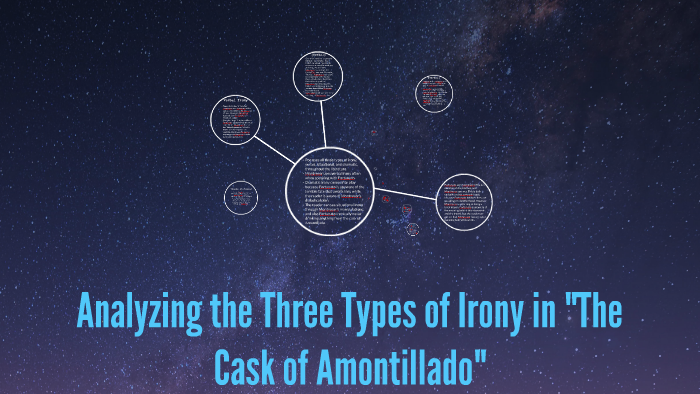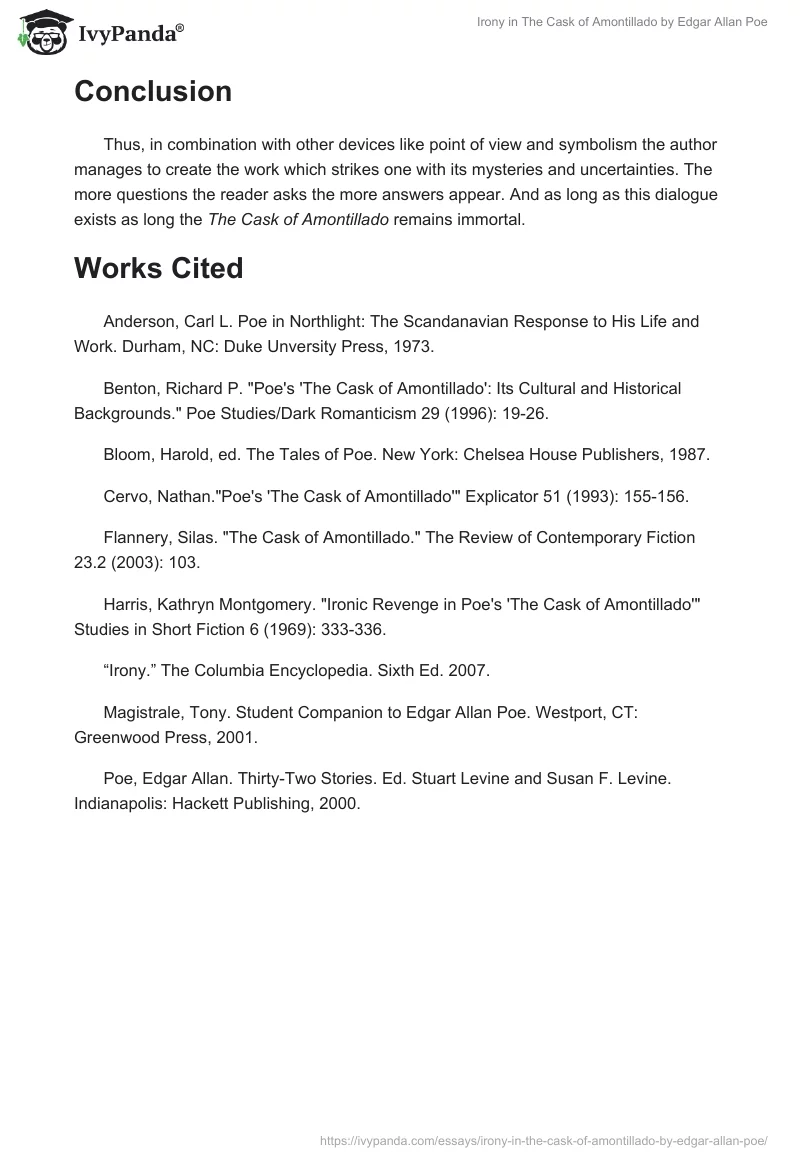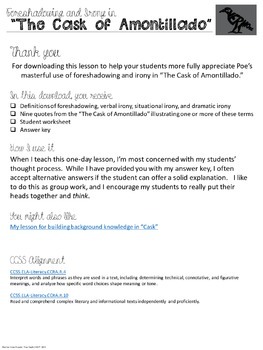This essay has been submitted by a student. There is nothing more compelling than the dramatic power that the villain holds over drama. In the stories of Edgar Allan Poe’s “The Cask of Amontillado” and Sir Arthur Conan Doyle’s Memoirs of Sherlock Holmes and William Shakespeare’s play “Othello” , rhetoric proves to be an amazing tool
Montresor in The Cask of Amontillado | Character Trait & Analysis – Video & Lesson Transcript | Study.com
In this paper, the reader will get a preview of verbal, dramatic, and situational irony in the story “The Cask of Amontillado.”. In verbal irony, words are used to suggest the opposite of what is really meant.”. In Cask of Amontillado“, Poe stated “My dear Fortunado, You are luckily met” (237). This statement is an example of verbal

Source Image: myexamsolution.com
Download Image
Situational Irony: 1. The title itself – “The Cask of Amontillado“. A cask is a barrel of wine but it is also the root word for casket. 2. Setting: The story takes place during Carnival, which is supposed to be a time of great happiness and joy and celebration, not murder. 3. Fortunato is dressed in motley, which is how a clown or a court

Source Image: slideserve.com
Download Image
Irony in “The Cask of Amontillado” by Edgar Allan Poe – 1437 Words | Research Paper Example
In the story “The Cask of Amontillado” by Edgar Allan Poe, Poe uses irony throughout story to allow the reader a little inside and humor on what is about to happen. Throughout the story examples of verbal, dramatic, and situational irony can be found easily and are helpful is foreshadowing what is to come.

Source Image: study.com
Download Image
Situational Irony In The Cask Of Amontillado
In the story “The Cask of Amontillado” by Edgar Allan Poe, Poe uses irony throughout story to allow the reader a little inside and humor on what is about to happen. Throughout the story examples of verbal, dramatic, and situational irony can be found easily and are helpful is foreshadowing what is to come.
Dramatic irony is a form of irony that is expressed through a work’s structure: an audience’s awareness of the situation in which a work’s characters exist differs substantially from that of the characters’, and the words and actions of the characters therefore take on a different—often contradictory—meaning for the audience than they have
The Cask of Amontillado by Poe | Symbolism, Imagery & Examples – Video & Lesson Transcript | Study.com
“The Cask of Amontillado” is a unique story as it appeals to readers through the use of irony. There are several types of literary irony present throughout this story, such as situational, dramatic, and verbal. Irony can influence the portrayal of a character in a story. Irony can also add intrigue and excitement to the plot of the story.
An Analysis of the Irony and Symbolism in the Cask of Amontillado | Kibin
Source Image: kibin.com
Download Image
Analyzing Irony and Foreshadowing in "The Cask of Amontillad by Savannah Schmoldt
“The Cask of Amontillado” is a unique story as it appeals to readers through the use of irony. There are several types of literary irony present throughout this story, such as situational, dramatic, and verbal. Irony can influence the portrayal of a character in a story. Irony can also add intrigue and excitement to the plot of the story.

Source Image: prezi.com
Download Image
Montresor in The Cask of Amontillado | Character Trait & Analysis – Video & Lesson Transcript | Study.com
Situational Irony: 1. The title itself – “The Cask of Amontillado“. A cask is a barrel of wine but it is also the root word for casket. 2. Setting: The story takes place during Carnival, which is supposed to be a time of great happiness and joy and celebration, not murder. 3. Fortunato is dressed in motley, which is how a clown or a court

Source Image: study.com
Download Image
Irony in “The Cask of Amontillado” by Edgar Allan Poe – 1437 Words | Research Paper Example
This essay has been submitted by a student. There is nothing more compelling than the dramatic power that the villain holds over drama. In the stories of Edgar Allan Poe’s “The Cask of Amontillado” and Sir Arthur Conan Doyle’s Memoirs of Sherlock Holmes and William Shakespeare’s play “Othello” , rhetoric proves to be an amazing tool

Source Image: ivypanda.com
Download Image
Cask of Amontillado Foreshadowing Irony Poe by Montine Vona Pergola
Situational Irony In The Cask Of Amontillado Verbal is the intentional use of words to mean something different from what the character actually says. Throughout the short story, Montresor continually uses verbal irony during his conversations with Fortunato in order to encourage Fortunato to follow him down into his family’s catacombs.

Source Image: teacherspayteachers.com
Download Image
The Cask of Amontillado –
In the story “The Cask of Amontillado” by Edgar Allan Poe, Poe uses irony throughout story to allow the reader a little inside and humor on what is about to happen. Throughout the story examples of verbal, dramatic, and situational irony can be found easily and are helpful is foreshadowing what is to come.

Source Image: excellenceenglish.com
Download Image
THe Cask of amontillado” – Blog
Dramatic irony is a form of irony that is expressed through a work’s structure: an audience’s awareness of the situation in which a work’s characters exist differs substantially from that of the characters’, and the words and actions of the characters therefore take on a different—often contradictory—meaning for the audience than they have

Source Image: acaskofamontillado.weebly.com
Download Image
Analyzing Irony and Foreshadowing in "The Cask of Amontillad by Savannah Schmoldt
THe Cask of amontillado” – Blog
In this paper, the reader will get a preview of verbal, dramatic, and situational irony in the story “The Cask of Amontillado.”. In verbal irony, words are used to suggest the opposite of what is really meant.”. In Cask of Amontillado“, Poe stated “My dear Fortunado, You are luckily met” (237). This statement is an example of verbal
Irony in “The Cask of Amontillado” by Edgar Allan Poe – 1437 Words | Research Paper Example The Cask of Amontillado –
Situational Irony In The Cask Of Amontillado Verbal is the intentional use of words to mean something different from what the character actually says. Throughout the short story, Montresor continually uses verbal irony during his conversations with Fortunato in order to encourage Fortunato to follow him down into his family’s catacombs.